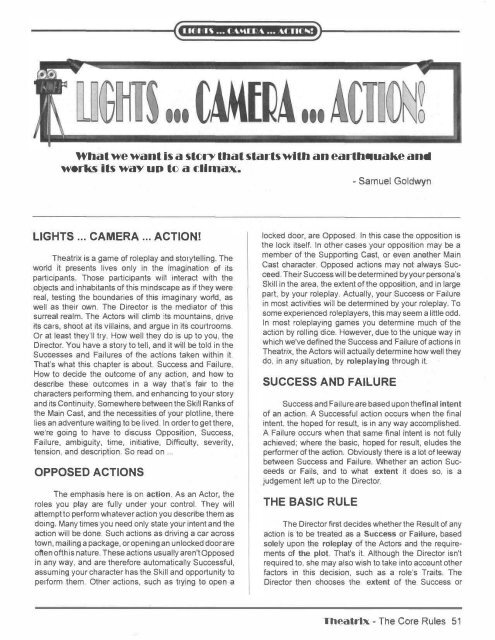Untitled - Index of - Free
Untitled - Index of - Free
Untitled - Index of - Free
You also want an ePaper? Increase the reach of your titles
YUMPU automatically turns print PDFs into web optimized ePapers that Google loves.
What we want Is a st()O' that starts with an earthquake and<br />
W()rks Its way up l() a climax.<br />
-Samuel Goldwyn<br />
LIGHTS ... CAMERA ... ACTION!<br />
Theatrix is a game <strong>of</strong> roleplay and storytelling. The<br />
world it presents lives only in the imagination <strong>of</strong> its<br />
participants. Those participants will interact with the<br />
objects and inhabitants <strong>of</strong> this mindscape as if they were<br />
real, testing the boundaries <strong>of</strong> this imaginary world, as<br />
well as their own. The Director is the mediator <strong>of</strong> this<br />
surreal realm. The Actors will climb its mountains, drive<br />
its cars, shoot at its villains, and argue in its courtrooms.<br />
Or at least they'll try. How well they do is up to you, the<br />
Director. You have a story to tell, and it will be told in the<br />
Successes and Failures <strong>of</strong> the actions taken within it.<br />
That's what this chapter is about. Success and Failure.<br />
How to decide the outcome <strong>of</strong> any action, and how to<br />
describe these outcomes in a way that's fair to the<br />
characters performing them, and enhancing to your story<br />
and its Continuity. Somewhere between the Skill Ranks <strong>of</strong><br />
the Main Cast, and the necessities <strong>of</strong> your plotline, there<br />
lies an adventure waiting to be lived. In order to get there,<br />
we're going to have to discuss Opposition, Success,<br />
Failure, ambiguity, time, initiative, Difficulty, severity,<br />
tension, and description. So read on ...<br />
OPPOSED ACTIONS<br />
The emphasis here is on action. As an Actor, the<br />
roles you play are fully under your control. They will<br />
attempt to perform whatever action you describe them as<br />
doing. Many times you need only state your intent and the<br />
action will be done. Such actions as driving a car across<br />
town, mailing a package, or opening an unlocked door are<br />
<strong>of</strong>ten <strong>of</strong>this nature. These actions usually aren't Opposed<br />
in any way, and are therefore automatically Successful,<br />
assuming your character has the Skill and opportunity to<br />
perform them. Other actions, such as trying to open a<br />
locked door, are Opposed. In this case the opposition is<br />
the lock itself. In other cases your opposition may be a<br />
member <strong>of</strong> the Supporting Cast, or even another Main<br />
Cast character. Opposed actions may not always Suc<br />
ceed. Their Success will be determined by your persona's<br />
Skill in the area, the extent <strong>of</strong> the opposition, and in large<br />
part, by your roleplay. Actually, your Success or Failure<br />
in most activities will be determined by your roleplay. To<br />
some experienced roleplayers, this may seem a little odd.<br />
In most roleplaying games you determine much <strong>of</strong> the<br />
action by rolling dice. However, due to the unique way in<br />
which we've defined the Success and Failure <strong>of</strong> actions in<br />
Theatrix, the Actors will actually determine how well they<br />
do, in any situation, by roleplaying through it.<br />
SUCCESS AND FAILURE<br />
Success and Failure are based upon thefinal intent<br />
<strong>of</strong> an action. A Successful action occurs when the final<br />
intent, the hoped for result, is in any way accomplished.<br />
A Failure occurs when that same final intent is not fully<br />
achieved; where the basic, hoped for result, eludes the<br />
performer <strong>of</strong> the action. Obviously there is a lot <strong>of</strong> leeway<br />
between Success and Failure. Whether an action Suc<br />
ceeds or Fails, and to what extent it does so, is a<br />
judgement left up to the Director.<br />
THE BASIC RULE<br />
The Director first decides whether the Result <strong>of</strong> any<br />
action is to be treated as a Success or Failure, based<br />
solely upon the roleplay <strong>of</strong> the Actors and the require<br />
ments <strong>of</strong> the plot. That's it. Although the Director isn't<br />
required to, she may also wish to take into account other<br />
factors in this decision, such as a role's Traits. The<br />
Director then chooses the extent <strong>of</strong> the Success or<br />
Theatrlx- The Core Rules 51



